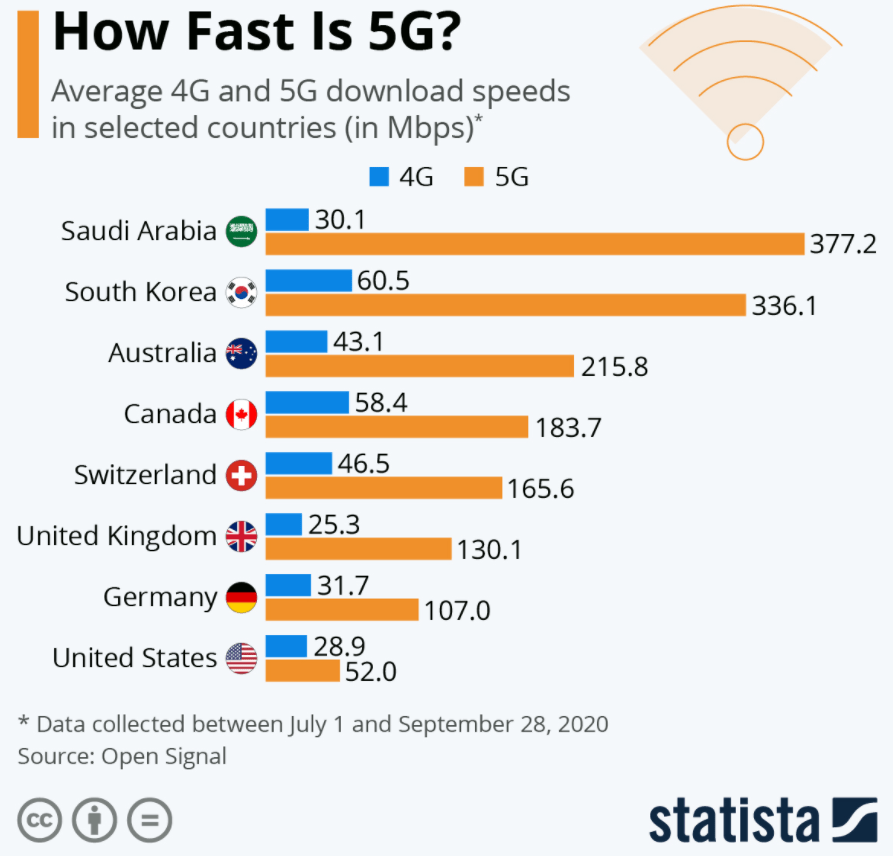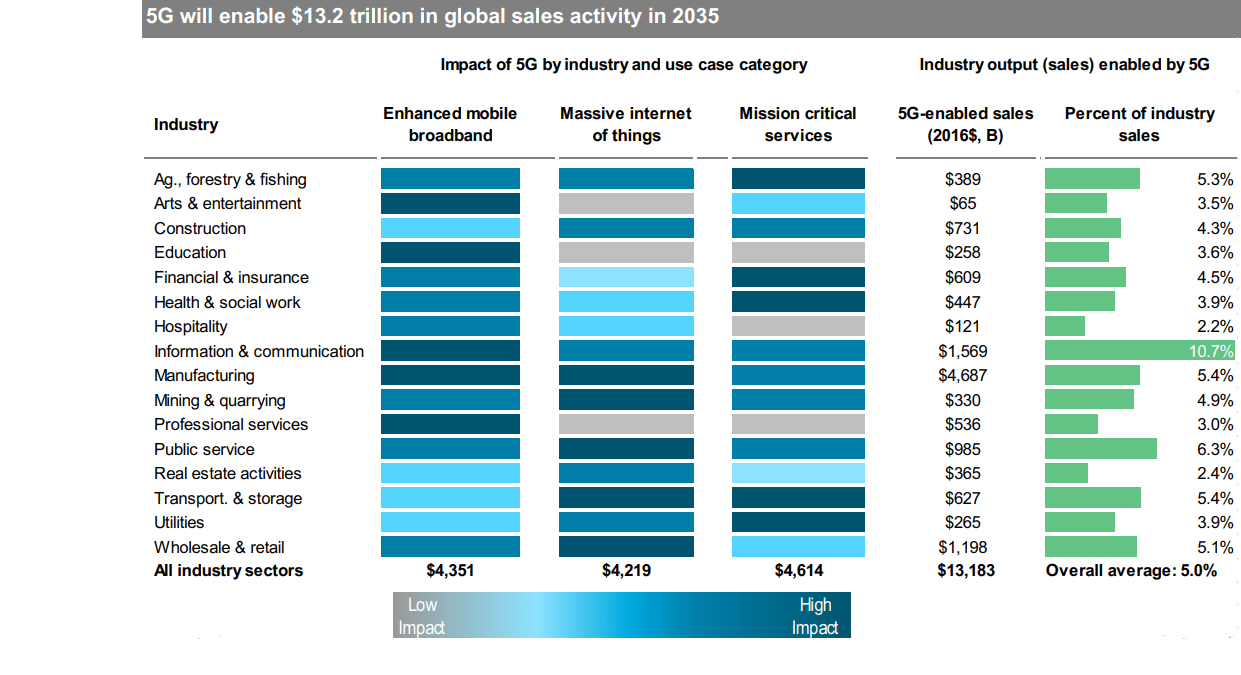How 5G will impact the economy

The Evolution of Mobile Technology
The time we spend on our mobile phones has risen drastically over the past couple of years. And so has the handset’s use case in our day-to-day lives. From ordering groceries to booking cabs, and a lot more, all in one gadget. You see, technology has drastically changed our lives – in an albeit subtle way. It was not until as recently as 2016/2017 that we started using food delivery apps like Swiggy and Zomato as much as we do now. It’s a similar story with essentials like Google Maps, and Uber/Ola, payment apps like PayTm, Google Pay, etc. But to understand where we are headed, let’s first look back at where we have come from. It was in the 1980s when we made the leap to wireless mobile technology. It was what we now call 1G or the 1st generation of wireless mobile technology. So the most basic use-case of our phone – which is to make calls – has its roots in 1G. Then came out 2nd generation or 2G. Along with calling people wirelessly, you could now send them messages and pictures. 2G also had some basic internet capabilities. Next came 3G – an even faster technology that now made things like video calls possible – all wirelessly. And last but not least, 4G came into being. 4G is estimated to be about 5-7 times faster than 3G – so it makes things like downloads, web access, streaming services, etc. incredibly quick. I’m not sure if you’ve discovered a pattern here yet, but each upgrade entailed speeds that were faster than what the previous generation offered. So, essentially, faster speed was what differentiated one from the other.
5G – It’s more than just speed
Okay, so what is 5G? Till now, improvement in wireless network technology has managed to connect more and more people. Also, with the advent of 4G, connectivity between ‘things’ has become a reality. Smart homes and smart speakers are examples of ‘things’ that 4G has made possible. With 5G, this will be taken to the next level. 5G, operational at full capacity, is expected to virtually connect everyone and everything including but not limited to machines, objects, homes, cars and other devices. It will not only provide its users with extra speed but low latency, massive availability, high network capacity and a more uniform user experience. These new capabilities are expected to impact us in our day-to-day lives like never before. Not only that, it is expected to revolutionise entire industries for good.
For example, self-driving cars. Though 4G has made self-drive cars a reality, it still does not have the capacity required for a seamless user experience with self-drive vehicles. Um.. for a car to drive itself, it requires a constant real-time inflow of data. With 5G, connected cars will also be able to communicate with other cars and roadside infrastructure, such as traffic lights. The capacity and speed of 5G will make these things possible. Quite cool, isn’t it?

How will it be used?
While looking to learn about 5G and its importance, I came across this interesting way of thinking about 5G and the impact it will create in the world around us. Before diving into the broad use cases of 5G, I’d like to share the same…
General Purpose Technologies (GPTs) are technologies that have the potential to affect entire economies at large. They are an elite class of technologies which alter or significantly change the course of business and society. The printing press, the internet, electricity, and the steam engine are some of the prime examples of GPTs. The magnitude of impact that GPTs create can ultimately be seen with enhanced human and machine productivity that ultimately translates into a higher standard of living for everyone subjected to such technology.
Well, do you notice how ‘mobile phones’ aren’t part of the list… yet? My guess is, that wireless mobile technology has been extremely successful in connecting people to people, but not everything to everything. Well, with 5G, that’s supposed to change. Analysts and economists around the world now think that mobile phones will be uplifted to the elite list of GPTs with the advent of 5G!
Let’s look at the broad use cases of 5G.
- Enhanced Mobile Broadband (eMBB): This is the basic improvement that we see across all different wireless mobile tech generations – speed. 5G will be fast – very, very fast. With 5G, there will be enhanced indoor and outdoor broadband coverage and training/education will be much more seamless than it already is over the current network arrangements. Augmented and Virtual Reality will also enter a whole new phase with much-improved applications in gaming. 5G will enable such a seamless experience for online shopping that you’d be able to cruise through your favourite stores in shopping malls using just your mobile handset.
- Massive Internet of Things (MIoT): The internet till now, consists of people. We are the producers and consumers of data that sits on the internet. As I’ve mentioned before, wireless mobile technology, up until now, has done a great job at connecting people to people. The latest 4G technology helped with building basic use cases that aided connections between things. 5G will take this to the next level with its superior power of data consumption, speed and low latency. Your homes, cars and other “things” will be able to interact and exchange data with their surroundings. Some of the applications of MIoT include smart agriculture, smart cities, asset tracking (like fleet management), and physical infrastructure like deploying wireless sensors to roadways, bridges, train tracks etc. among other things.
- Mission Critical Services (MCS): Mission Critical Services are those services that are absolutely critical for the operation of a unit or the entire organisation. MCS represents a potentially huge growth area for 5G to support applications that require high reliability, ultra-low latency connectivity with strong security, and availability. Autonomous vehicles, drones, industrial automation, medical services like remote patient monitoring etc. are some of the areas which will see immense innovation once 5G comes into being.
Opportunities and challenges that 5G creates
As is clear by now, 5G is poised to revolutionize societies and businesses alike. A lot of these developments can be foreseen due to the research that analysts have done over the years, but a lot of it is still unknown to us – and will continue to be so, till we actually start using the technology more and more often.
Having said that, the world is quite bullish on the prospect of 5G and its potential to have a net positive impact on humanity at large. IHS Markit, in a report, estimates that potential global sales activity across multiple industry sectors enabled by 5G could reach $13.2 trillion in 2035. This represents about 5% of all global real output in 2035. For the period 2020-35, forecasts suggest that global real GDP will grow at an average annual rate of 2.5%, of which 5G will contribute almost 0.2% of that growth. From 2020 to 2035, the annual GDP contributions of 5G will total almost $2.7 trillion! Having said that, the 5G infrastructure is going to be expensive. Estimates suggest that it will cost $1 trillion to build! However, as for the silver lining, forecasts estimate that the present value of the benefits that 5G will bring about is going to be about $2.1 trillion. So it might make economic sense, but we must remember that these are mere forecasts based on assumptions – there is a chance that reality might be different.

You see, any potential development that can change the course of business and society comes at a cost and with a few challenges. 5G is no different. The 5G economy will introduce new challenges for policymaking as new business models emerge and the old ways of doing business are either dramatically altered or abandoned completely. Areas, where policy and regulatory modernization will be required for a 5G-ready world include cybersecurity, public safety, spectrum allocation, privacy, healthcare, education etc.
Policymakers must be very mindful while thinking about policy implementation in a post-5G world such that they must address the problems that come along with the ubiquity of 5G in our everyday life while also not implementing policies that stunt the continued innovation and development that is critical to the success of the 5G economy. Simply put, policies should safeguard the interest of all stakeholders such that firms can make informed decisions about taking risks, making investments and striving for relentless innovation.
Disclaimer: Investment in securities market are subject to market risks. Read all the related documents carefully before investing. Registration granted by SEBI, membership of a SEBI recognized supervisory body (if any) and certification from NISM in no way guarantee performance of the intermediary or provide any assurance of returns to investors.
The content in these posts/articles is for informational and educational purposes only and should not be construed as professional financial advice and nor to be construed as an offer to buy /sell or the solicitation of an offer to buy/sell any security or financial products.Users must make their own investment decisions based on their specific investment objective and financial position and using such independent advisors as they believe necessary.
Windmill Capital TeamWindmill Capital Private Limited is a SEBI registered research analyst (Regn. No. INH200007645) based in Bengaluru at No 51 Le Parc Richmonde, Richmond Road, Shanthala Nagar, Bangalore, Karnataka – 560025 creating Thematic & Quantamental curated stock/ETF portfolios. Data analysis is the heart and soul behind our portfolio construction & with 50+ offerings, we have something for everyone. CIN of the company is U74999KA2020PTC132398. For more information and disclosures, visit our disclosures page here.





